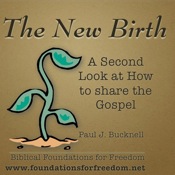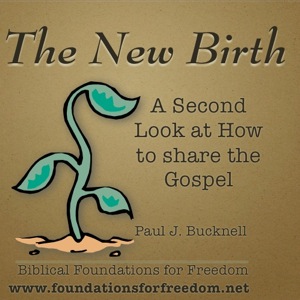
The New Birth & Evangelism
Another Look at How to Share the Gospel or Witness
- An Introduction-
Paul J. Bucknell
Evangelism or witnessing is often thought of as an arrogant intrusion of one's will upon another. There are many misleading assumptions seeded in our cultures that lead to this misunderstanding. This, however, has nothing to do with sharing the hope and life that comes from sharing the precious gospel of Jesus Christ.
Unfortunately, not many Christians actually evangelize. But even then, those who do, often witness by focusing on winning an argument, trying to persuade another of God's truth. I do believe in God's truth but have found this means not very effective when witnessing to those by secularism or the New Age. Sometimes this is needed, but many in our cultures no longer believe in absolute truth.
Another problem with this kind of 'persuasion evangelism' is that the love and grace of God is not easily seen. Sometimes it is hidden by a forceful argument. The Lord has led me to another kind of evangelism, perhaps it could be called 'confessional evangelism'.
I share the gospel by testifying of God's great work of mercy and grace in my life. Instead of parading my arguments before a person, I paint the ugly picture of my life without Christ. This is not because I have a particularly bad past compared to others, but because I have begun to really understand what I am like without God's grace (i.e. the flesh, the old nature).
People do not mind hearing of my failures. When I witness in this manner, I gain a magic key to another's heart. You see, we all share many of the same personal problems. When I see them intently listening, it is then I slow down and see if they would like to hear how the Lord wondrously worked out my problem through Christ's work. More than often, they like to hear of this kind of God's work in my life for they too have a similar problem.
Notice the Psalmist's response to God's work in his life.
"But I have trusted in Thy lovingkindness;
My heart shall rejoice in Thy salvation" (Psalms 13:5).
What about all the arguments? I bypass them. How? Well, I find most people only bring up many arguments that they have heard but do not really care about. Speak to what they are interested in: bad relationships, loneliness, debt, lack of self-control, etc.. They can identify with these. These other questions are secondary to them. Important ones will still come up but at least they are important to them.
 In any case, this is just a 'starter kit'. If you want to learn more, I invite you to listen to the podcast as I both:
In any case, this is just a 'starter kit'. If you want to learn more, I invite you to listen to the podcast as I both:
- Describe the new life through a Bible study passage on 1 Peter 1:23-25 and
- Speak on how I witness or share the gospel with most individuals in our modern society.
Questions from the listeners help work through some of the common misunderstandings. If there are other questions or problems, email me (below) and I will try to post them on the podcast page!
![]()
Prefer reading?
Check out some of the BFF relevant articles to evangelism on the top right of the right column.






